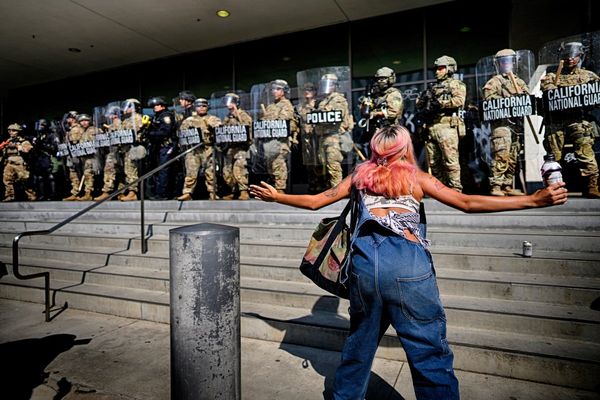The reigning champion, and undisputed winner, from the first Republican debate of presidential hopefuls? Donald Trump. Even in his absence, he was the main spectacle.
That much was predictable. Although many tried to dance around him, every candidate had to address the “elephant not in the room”. That put Trump centre-stage, in the limelight — exactly where the 2024 Republican favourite wanted to be.
Without Trump at a podium, it made critiques of him seem unfair, or land more softly, because he wasn’t there to defend himself. At the same time, Trump’s no-show only made him loom transcendentally larger with the Maga (make America great again) crowd that will determine the party’s nominee.
All of this put Trump’s rivals in the same catch-22 that’s defined their seemingly futile campaigns: they can’t attack Trump because they’ll alienate the Republican base. But they can’t not attack Trump or he’ll cruise to the nomination untouched.
No one (as yet) has solved that puzzle. So nothing from the first debate disturbed the not-so-delicate status quo: this is Trump’s race to lose.
Notable moments
While the debate did little to deflate Trump, it did have some elucidating moments. Candidates had to answer tough questions, from their opinion on a national abortion ban to Washington’s support for Ukraine.
Yet again, perhaps the most memorable question revolved around Trump. When asked whether they would back the ex-president if he were criminally convicted, all the candidates raised their hands, save former New Jersey governor Chris Christie and former Arkansas governor Asa Hutchinson.
“Someone’s got to stop normalising this conduct, OK?” Christie declared.
The response earned Christie boos, a testament to what the polling shows: the vast majority of Republican voters – nearly eight in ten – continue to view criminal allegations against Trump as politically motivated.
Trump’s power move
Trump skipping the debate was the ultimate power move. It was Trump positioning himself as the inevitable Republican nominee. It was him telling voters: you have no choice. This will be a coronation, not a primary.
That overture might rub some Republicans the wrong way. Plenty of voters in Iowa, New Hampshire, and other early primary states like the illusion that they control the destiny of presidential nominations.
Read more: Nikki Haley: the 'new generation' candidate trying to win the Republican nomination
But for an ex-president who’s emerged from four indictments not only unscathed, but with a roughly 35-percentage-point lead in the polls, such a message isn’t cheap talk.
Florida governor Ron DeSantis, the early darling of the donor class, has watched his chances of out-Trumping Trump die on the vine. Few even tried to land blows on him at the debate.
Meanwhile, other White House hopefuls, like South Carolina Senator Tim Scott and former UN ambassador Nikki Haley, seem to be vying for a vice presidential nod.
Vivek Ramaswamy, the 38-year-old rookie politician with oratorical skills to burn, was the surprise focal point after his recent rise in the polls led to debate pile-ons. Yet his relentless defence of Trump, including his pledge to pardon him if elected, tees him up better for a cabinet post, or a 2028 run.
For an outlier like Christie, the Trump critic (who endorsed Trump in 2016), the boos he endured were a telltale sign: he’s out of step with the GOP base.
And then there’s former vice president Mike Pence. If it wasn’t clear before, the debate proved that he’s too Maga for moderates, and too moderate for Maga.
Risks ahead
Not turning up worked to Trump’s advantage in the first debate. Trump didn’t have to compete, and he still overshadowed the event.
One question, though, is whether Trump will be in fighting form whenever the field narrows, and the Republican party coalesces around an alternative choice (if that happens). Debates tend to sharpen candidates and make them battle-tested.
If Trump does eventually debate in the primaries, which (despite reports otherwise) he might be tempted to, the stakes will be higher. Could one stumble by Trump — or a viral moment where he’s on the short end of the stick — blunt his inexorable march to the nomination?
Downstream, Trump has also been warned that if he doesn’t debate, Joe Biden will have an easy excuse to say he won’t debate in the general election, either. And a debate with Biden is something that the Trump team will desperately want.
Trump blasted Biden in 2020 for running his campaign from his Delaware basement. Yet now it’s Trump who’s nowhere to be seen, except the interior of a Georgia courthouse.
As one analysis has observed, “gambling on finding strength in indictments instead of debates” poses risks. But for now, the Republican primaries remain a Trump lovefest.
Debates or no debates, Trump is the candidate to beat.
Thomas Gift does not work for, consult, own shares in or receive funding from any company or organisation that would benefit from this article, and has disclosed no relevant affiliations beyond their academic appointment.
This article was originally published on The Conversation. Read the original article.







